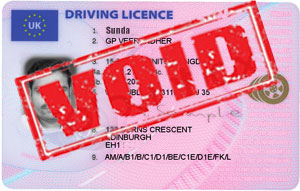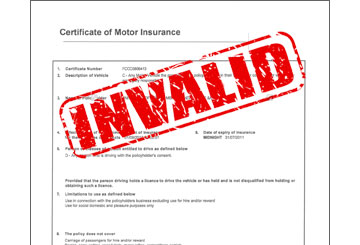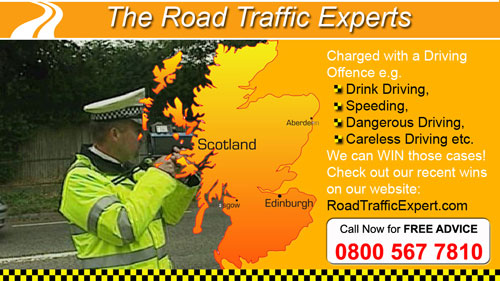No Insurance, No Mot or No Driving Licence?
 Under s 87(1) of the Road Traffic Act 1988 it is an offence to drive a vehicle without a license appropriate to a vehicle of that class or to drive a vehicle on a provisional license unless accompanied by an appropriate person and displaying "L" Plates on your vehicle.
Under s 87(1) of the Road Traffic Act 1988 it is an offence to drive a vehicle without a license appropriate to a vehicle of that class or to drive a vehicle on a provisional license unless accompanied by an appropriate person and displaying "L" Plates on your vehicle.
For holders of a provisional license an ‘appropriate person’ is a full license holder who is over the age of 21 and has held a full driving license for at least three years.
If a driver is convicted of driving without a license then they will almost inevitably incur between three and six penalty points and can be fined up to £1000. The courts also have the power, exercised on a discretionary basis, to disqualify such a driver from holding or obtaining a license for a period of time.
Driving a vehicle without an appropriate license will almost inevitably render any insurance policy held for that vehicle invalid and those charged with driving with driving without a license will almost inevitably face charges of driving without insurance (see separate subject heading). The insurance policy in question should however be closely scrutinised so as to ascertain whether it allows the policy holder to grant permission to drive to a person"Who holds or has held a driving license". If such a clause exists then it will not necessarily follow that a person convicted of driving without a license will be convicted of using a car without a valid insurance policy.
Driving without Insurance
 Under s143 of the Road Traffic Act 1988 it is an offence to use (or permit to be used) a motor vehicle on a road or other public place when there is not in force in relation to the use of the vehicle such a policy of insurance in respect of third party risks as complies with the Road Traffic Act.
Under s143 of the Road Traffic Act 1988 it is an offence to use (or permit to be used) a motor vehicle on a road or other public place when there is not in force in relation to the use of the vehicle such a policy of insurance in respect of third party risks as complies with the Road Traffic Act.
If you are found guilty of an offence under this section then you will face a penalty of between six to eight penalty points and a fine of up to £5000. Courts in Scotland also possess the power, yet again exercised on a discretionary basis, to disqualify drivers from holding or obtaining or license.
It is important to note that the concept of ‘use’ is an extremely wide one and that it is not necessary for an accused person to actually drive a car for them to be deemed as ‘using it’. A car could be stationary in a public place or parked on a public road and if there is no valid policy of insurance then an offence is committed.
In addition it should be noted that this offence is a strict liability offence which means that, regardless of what a driver believed the situation to be, if they are unable to prove that a valid policy of insurance was in place they will be guilty of an offence.
There is however a defence available to this charge if an employee drives in the course of their employment having been led to believe by his/her employer (and owner of the vehicle in question) that insurance was in place. This is a statutory defence which means that it is for the accused person to prove that it applies on the balance of probabilities.
Even where no defence is available it is also possible for the court to decide that ‘Special Reasons’ (See separate subject heading) apply and to refrain from the imposition of penalty points for this offence even though an accused person is technically guilty. Such a situation may arise where a person has driven in the mistaken belief that insurance was in place only to find that, due to circumstances beyond their control, it has not been put in place or has been unexpectedly cancelled.
It is also worthy of note that an essential component of this offence is that the vehicle be found in a ‘public place’ or ‘road’ and that there is an abundance of case law on what amounts to a ‘public place’ or ‘a road’. It is therefore very much in an accused person’s interests to seek legal advice at an early stage.
Often, an individual who has never before been prosecuted under section 143 will be offered an alternative to prosecution in the form of a fixed penalty of £200 and six penalty points. If such an individual does not qualify for a ‘special reasons’ argument then strong consideration should be given to accepting such a penalty. Failure to do so could result in a substantially greater fine being imposed.
Causing or permitting use of vehicle without insurance
If you cause or permit someone to use your vehicle without insurance you will be liable to prosecution and penalisation in the same way as if you had driven the vehicle yourself.
This situation can easily arise where one lends a vehicle to a friend or family member only to later discover that that person was not insured.
The onus is on you as the owner of the vehicle to take all reasonable steps to ensure that insurance is in place when you let another person drive your vehicle.
If you have been charged with driving a vehicle without a valid MOT click this Link: Driving without a valid MOT.
Examples of recent cases showing how we beat charges of driving without insurance or driving without a valid driving licence:
- We utilize a little known legal technicality and convinced Fiscal to drop proceedings at court!
- Plea of not guilty accepted for taking away charge, and special reasons held to be established by the court for driving without insurance. No points imposed.
- Client facing a totting up points driving disqualification after being found driving uninsured. We persuade court that he thought he was genuinely insured and no points are imposed, saving his licence.
- Client on 6 penalty points and facing a driving ban for driving without insurance. Another road traffic lawyer was not hopeful at all. However, clients reads about our reputation and we win the case for him.
- Client advised by other road traffic lawyers to plead guilty but after hearing about our expertize approaches us. We find a defence to use at court and tenaciously fight the charges and Fiscal agrees to drop the case!
- Young driver facing driving license being revoked. Client just purchased car and wrongly thought he was insured to drive it home. Despite the evidence we argue certain issues and persude Fiscal to drop the case. Client very relieved!
- This client was in very serious trouble but we find technical issues and persuade the Fiscal to drop the case. Client extremely relieved!
- Our client denies any guilt. We closely scrutinize the police office statements and find inconsistencies which we use to persuadee the Fiscal to drop the charges. Client is Delighted.!
- A very interesting case in which we win a Not Guilty verdict despite the client being guilty!
- Client already on 9 points and facing totting up ban. We develop a winning strategy and save his driving licence. A cat with nine lives!
- Within weeks of being disqualified (represented by another solicitor), client faces imprisonment for 6 new serious driving offences including No Insurance charges as well as charges for perverting the course of Justice. Other solicitors informed him to expect imprisonment. However, Richard Freeman A.K.A Mr. Technicality, rigourously reviewed the evidence and found some evidential and procedural issues. We get most charges dropped, a very lenient penalty for other charges and no imprisonment. Client ecstatic!
- Client is new driver and faces licence being revoked. Advised by other solicitors to plead guilty but we persuade client to hire us and vigorously fight the case in court and Win a Not Guilty! veridct. Client ecstatic!
- Client was driving car when stopped by police for not having insurance. We build adefence for Special reasons to be upheld and no endorsements made to licence or even a fine!
- New Driver, facing a penalty point Totting Up disqualification, licence revocation and having to retake driving test. We put toegther a strong case in her defence and persuade the Fiscal to drop the case.
- Driving without a valid driving licence, causing and obstruction and no MOT on vehicle. We find a weakness in Fiscal case and use it as leverage to have the more serious charges dropped. Fiscal agrees, client gets No Penalty points at all and only £100 fine!
- Client previously defended himself and had pled guilty to speeding charge before appointing us. He faced a driving ban on other charges. However after appointing us, we do our homework and argue his Pakistani licence was valid and so was insurance. Charges dropped and client allowed to drive.
- No Insurance on new vehicle and driving it for business purposes. We use a hardly known technicality and case is dropped!
- Facing Totting up ban and driving without insurance. We persuade the crown to drop the case!
- We show unlawful police behaviour and persuade Fiscal to drop case on day of trial!
- Invalid license & No Insurance. We win admonished verdict and no penalty points after special reasons upheld!
- Faced a very long ban extension, but we argue the circumstances strongly and client just gets penalty points!
- Faced a very long ban extension, but we argue the circumstances strongly and client just gets penalty points!
- Admitted to the police that he was the driver. However we find a fatal lack of evidence and get case dropped!
- Probationary driver on vacation found uninsured car impounded. 6 points also meant a Ban! We manage to persuade fiscal to drop the case!
- We use a Statutory Defence and build Special Reasons Defence. The result being: No Points or even a fine!
- Stopped by police after being informed by insurance company that policy was cancelled. We identify technicality issues and Fiscal agrees to a plea of Not Guilty!
- Employer and Employee Facing Mandatory ban We save both licences!
- Client had previously lost case using another solicitor and so lost his driving licence due to Totting Up points. We argue Judge erred in Law & win his appeal case. No penalty! Client ecstatic!
- Driving 103mph, weaving between lanes to avoid police! Facing a 12 month ban and resit of driving test. We persuade the fiscal to reduce charges and save his driving licence
- Driving without Insurance and facing Totting up Ban. We present our case and persuade Fiscal to drop charges !
- Stopped for No seatbelt, then charged with No insurance or driving licence! We argue technicalities & win Not Guilty!
- Driving on a provisional licence without L plates and a qualified driver. We utilise the clients International Licence instead of his UK Licence and get the case discontinued.
- On 6 Points, but we get Prosecutor to back down, Client gets Not Guilty!
- Director of company charged because Employee was Uninsured, and Totting up Points would have meant a ban. We get both off completely!
- Not guilty trial for a Police Inspector at Hamilton JP Court
We Cover All of Scotland

All of Scotland Covered:
Including: Glasgow Edinburgh Aberdeen Dundee Paisley Renfrewshire East Kilbride Perth Livingston Cumbernauld Hamilton
Kirkcaldy Dunfermline Ayr Kinross Kilmarnock Inverness Greenock Inverclyde Port Glasgow
Coatbridge North Lanarkshire Glenrothes fife Airdrie Falkirk Stirling Rutherglen Dumfries Galloway Motherwell Wishaw Clydebank West Dunbartonshire Bearsden East Dunbartonshire Cambuslang Newton Mearns East Renfrewshire Bishopbriggs Musselburgh East Lothian Arbroath Angus Polmont Elgin Renfrew Renfrewshire Alloa Bellshill Clackmannanshire Blantyre Dumbarton West Dunbartonshire Kirkintilloch Clarkston
East Renfrewshire Bathgate West Lothian Stenhousemuir Falkirk Peterhead Aberdeenshire Barrhead
Grangemouth Falkirk St Andrews Fife Kilwinning Ayrshire Giffnock viewpark Buckhaven Penicuik Midlothian Stranraer Johnstone Erskine Larkhall Moray


